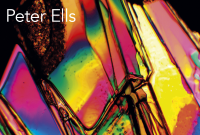
LC: So Matthew - tell us 5 things about prime numbers readers will find out about in SoC
MW: * They are the "building blocks" of the number system. That is, every counting number after 1 is either a prime number or else it can be "built" by multiplying primes together (in a unique way).
* The prime numbers go on forever (i.e., there's no largest prime). We can be absolutely certain of this as it was proven by Euclid around 300BCE. His ingenious proof is as valid today as on the day he first wrote it down and is still taught to university students.
* There's no "pattern" or "formula" that can be used to determine the exact occurrence of primes within the number system. However, there *is* a formula, closely related to the geometry of spirals, which provides *statistical* information on the likelihood of finding primes in given stretches of the number line.
* Hidden behind the seemingly random scattering of prime numbers, there's a "harmonic structure", made up of an infinite set of wave-like forms whose frequencies remain deeply mysterious. This fact was unknown to humans prior to the late 1860s and is still unknown to a surprisingly large proportion of professional mathematicians. In fact, there are several things explained in Volume 1 which I hadn't learned until years after I completed my PhD in pure mathematics!
* They have been used in attempts to communicate with extra-terrestrials, being just about the only thing we could expect all sentient life forms to recognise.
LC: Staying with the numbers theme, 4 reasons why you think mathematics is fun
MW: Unlike a lot of "popular maths" writers, I don't really see mathematics as "fun", but here are some reasons why I think learning maths can be worth the effort:
* No matter how much you learn, you're still only ever dipping you toes into a vast ocean. The "mathematical landscape" extends infinitely in all directions. It's the ultimate mental playground, but it's also deeply humbling.
* It cuts across history, geography, culture and opinion. It's just about the only thing everyone can agree about, and at a time of increasing disagreement, conflict and factionalism, there's something quite comforting about that.
* Many aspects of the universe (but by no means all, just the ones physicists are able to model) appear to have an underlying mathematical structure. So learning maths allows you to cultivate a kind of mental outlook that can watch the world with a deeper intuitive understanding of how (some) things work, even without learning the physics. For example, I'm aware that there are differential equations which govern the flow of heat and the propagation of electromagnetic energy. I couldn't write these equations down if you asked me (I'm not a physicist, I'd have to look them up), but I do know what differential equations are, so my intuitive understandings of heat flow and electromagnetic phenomena are arguably more advanced than those of someone unfamiliar with differential equations.
* At the deepest level, we *don't really know what mathematics is*. So learning maths allows you to engage with a genuine mystery. Unlike mysteries of a religious or occult nature, however, this requires no faith, and there will never be any doctrinal schisms.
LC: 3 books - why?
MW: Originally, I intended to write a single book. But when I'd finished the first draft and sat down with Matt Tweed (the illustrator) to look at the layout, we started to realize that it would be an unappealingly huge tome that would take us years to produce, and which would look seriously daunting to potential readers. I couldn't see a way forward and came close to dropping the whole project, but then during a sleepless, delirious night suffering from 'flu, I saw how it could work as a trilogy. There were a couple of points in the narrative which worked particularly well as "cliffhangers", and which divided the whole thing roughly into thirds. There's something appealing about trilogies, having a clearly defined beginning, middle and end. We jokingly decided that our trilogy mirrors The Lord of the Rings, with the second volume a bit slimmer and denser than the rest, a necessary bridge into the epic finale!
LC: What are 2 of your favourite numbers?
MW: It's funny how often I get asked for my favourite number! To be honest, the way I think about numbers isn't really compatible with that kind of favouritism. It would be like asking me to name my favourite internal organ! It's the way that they interdependently hang together as a "number system" that fascinates me. But to save myself long disclaimers, I've taken to telling people that my favourite number is 1. 1 is great! It has many unique properties. In certain contexts, mathematicians refer to it formally as "the unit" or even "unity". Despite widespread misunderstanding (and pre-19th century mathematical thinking), 1 is *not* considered a prime number, for reasons I explain in Volume 1. It's neither prime nor composite (non-prime), but rather exists in a category of its own.
When I was younger and reading a lot of weird countercultural literature like William Burroughs and Robert Anton Wilson, 23 was my favourite number (if you don't know about it, look up the "23 enigma"). Although I've since moved away from that (a terrible Hollywood film called "The Number 23" was the final nail in the 23 coffin for me), when 23's crop up unexpectedly in daily life they sometimes make me smile. So I suppose I still have a soft spot for 23, even though it's more to do with my personal/subcultural history rather than any mathematical properties of the number itself.
LC: Is there 1 event that got you hooked on numbers?
MW: When I was five, walking home from school with my mum (I can still picture the exact location), I was suddenly struck by the fact that 3+5 produces the same result as 5+3, and likewise for any pair of numbers. This is called "commutativity of addition", and is something most people grasp early in their education but never dwell on, just taking it for granted. For me, the sudden realisation of this fact was charged with a sense of mystery, that there was more to the number system than I had previously thought. And that feeling has never really gone away.
LC: And finally, why the title 'Secrets of Creation'?
MW: In the 1970s, a famous mathematician called Don Zagier was asked to give a public lecture at the University of Bonn and chose the topic of prime numbers (it being a reasonably
accessible topic for the general public). In this lecture, he stated "Upon looking at these numbers, one has the feeling of being in the presence of one of the inexplicable secrets of creation." I
was struck by the fact that this language had more in common with the mystical writings of Blake or Milton than the sort of thing you'd expect from a professor of mathematics. I then started to find
more and more quotations from mathematicians writing about prime numbers and related matters which contained a similar use of mystical/religious/ecstatic-type language
and became fascinated by this phenomenon. It's not a mathematical phenomenon, but rather one on the border of maths and psychology, an area which I feel hasn't yet received the attention it deserves:
why do certain mathematical ideas cause certain emotional responses in us? These issues are not directly explored in the trilogy, but they very much informed it.
The original idea was to name the (pre-trilogised) book "Inexplicable Secrets of Creation", but a wise friend pointed out that including the word "inexplicable" was self-defeating if it were meant to describe something I was attempting to explain! So it became just "Secrets of Creation". Once Matt and I had decided to split the book into a trilogy, the individual volume titles came easily, and "Secrets of Creation" seemed an appropriate name for the trilogy as a whole.
It is perhaps something of a double-edge sword, in that it draws some people in (they want to know the secrets!), whereas other people are suspicious that the books are pushing some kind of religious or "new age" agenda. But I can always fall back on the fact that it was Professor Zagier who said it, not me!
Secrets of Creation, by Matthew Watkins, illustrated by Matt Tweed, published by Liberalis Books is available from on line and independent bookstores now.
http://www.liberalisbooks.com/authors/matthew-raymond-watkins
Categories:
0 comments on this article







